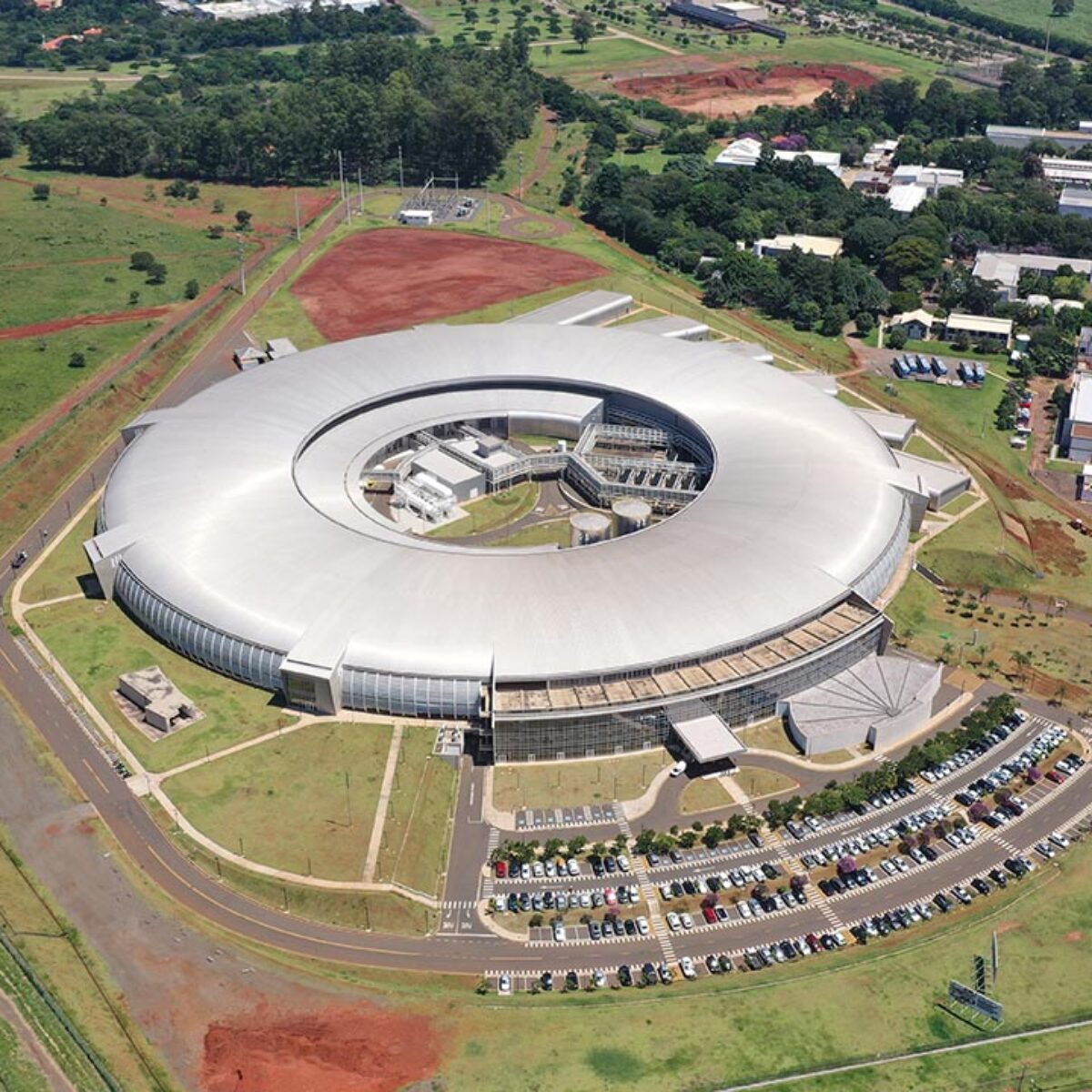
Sirius, the synchrotron lightsource operated by CNPEM. Photo from March 2023 (CNPEM)
The Brazilian Center for Research in Energy and Materials will host selected participants in the Summer Scholarships, Sirius School for High School Teachers, and Future Scientists programs
The year began with the arrival of over 100 teachers and students from Brazil and beyond to the campus of the Brazilian Center for Research in Energy and Materials (CNPEM) in Campinas, São Paulo. This institution, which is overseen by the Brazilian Ministry of Science, Technology and Innovation (MCTI), is welcoming participants in three important projects that link science and education.
For 12 years, the “Future Scientists” program created by the Northeast Center for Strategic Technologies (CETENE) has encouraged contact between female students and teachers from public schools and science, technology, engineering, and math (the areas known as STEAM). Since last year, this project has incorporated partnerships with universities and research centers in five of Brazil’s major regions.

Participants in the “Future Scientists” program (Outreach/Cetene)
At CNPEM in January, 14 students will have the opportunity to participate in scientific immersion at the Brazilian Synchrotron Light, Biosciences, Nanotechnology, and Biorenewables National Laboratories, as well as the Ilum School of Science.
In-person and remote activities are planned for learning about materials and phenomena at the atomic scale, water treatment using nanofiber from sugarcane, colors at the nano scale, and X-ray imaging using computational mathematics, which are among the topics that have been explored at CNPEM’s research and teaching units.
The selected students will receive scholarships funded by the Brazilian National Council for Scientific and Technological Development (CNPq), as well as a kit containing the materials needed to conduct the experiments.
The CNPEM Summer Scholarships Program is in its 31st edition, welcoming undergraduate students from five Latin American countries (Argentina, Colombia, Peru, Ecuador, and Guatemala) as well as 15 Brazilian states and the Federal District.

Reception for 2023 Summer Scholarship recipients (Outreach/CNPEM)
The objective of the program is scientific outreach, while encouraging young people to follow careers in science and technological development. The 31 participants will spend January and February carrying out internal research projects under the supervision of researchers from the four national laboratories at CNPEM.
The 6th edition of the Sirius School for High School Teachers (ESPEM), held in partnership with the Brazilian Physical Society (SBF), provides an immersion in the scientific research and development atmosphere at CNPEM for education professionals. Sixty educators from public and private schools in all regions of Brazil and five other Latin American countries were selected to participate in hand-on activities with workshops, demonstrations, and pedagogical discussions on new ways to approach current scientific knowledge in the classroom. The participants will also visit CNPEM’s facilities, including Sirius (the synchrotron light source for which the school is named) and the science labs and engineering infrastructure at the Center, as well as the undergraduate program in science, technology and innovation at the Ilum School of Science.

Participantes da ESPEM em visita ao Sirius (Divulgação/CNPEM)
“One of the missions of CNPEM is to train different actors in the National System for Science, Technology, and Innovation. This intensive experience brings these young people and teachers together in cutting-edge projects, reinvigorates our working environment, and represents an enriching opportunity to interact for everyone involved. These initiatives are strategic for the shaping of human resources,” emphasizes Antonio José Roque da Silva, Director General of CNPEM.
Future Scientists – In-person activities January 8 to 25, 2024
Summer Scholarships Program (PBV) – January 5 to March 1, 2024
Sirius School for High School Teachers (ESPEM): January 15 to 19, 2024
A sophisticated and effervescent environment for research and development, unique in Brazil and present in few scientific centers in the world, the Brazilian Center for Research in Energy and Materials (CNPEM) is a private non-profit organization, under the supervision of the Ministry of Science, Technology and Innovation (MCTI). The Center operates four National Laboratories and is the birthplace of the most complex project in Brazilian science – Sirius – one of the most advanced synchrotron light sources in the world. CNPEM brings together highly specialized multi-thematic teams, globally competitive laboratory infrastructures open to the scientific community, strategic lines of investigation, innovative projects in partnership with the productive sector and training of researchers and students. The Center is an environment driven by the search for solutions with impact in the areas of Health, Energy and Renewable Materials, Agro-environment, and Quantum Technologies. As of 2022, with the support of the Ministry of Education (MEC), CNPEM expanded its activities with the opening of the Ilum School of Science. The interdisciplinary higher course in Science, Technology and Innovation adopts innovative proposals to offer excellent, free, full-time training with immersion in the CNPEM research environment. Through the CNPEM 360 Platform, it is possible to explore, in a virtual and immersive way, the main environments and activities of the Center, visit: https://pages.cnpem.br/cnpem360/.
Verônica Teixeira, a researcher at the Brazilian Synchrotron Light National Laboratory (LNLS/CNPEM), was one of seven professionals recognized as part of L'Oréal Brasil's initiative “Para Mulheres na Ciência” [For Women in Science]
An oral presentation by Flávio Henrique Feres (LNLS) and a poster by Jaqueline Rocha (LNNano) were among the projects recognized during the XXI B-MRS Meeting, in Maceió, Alagoas